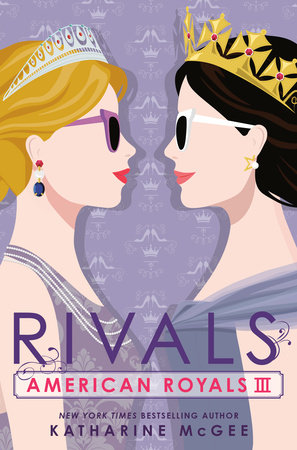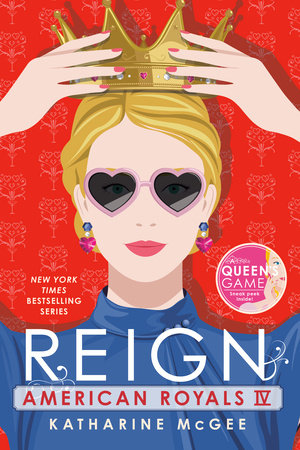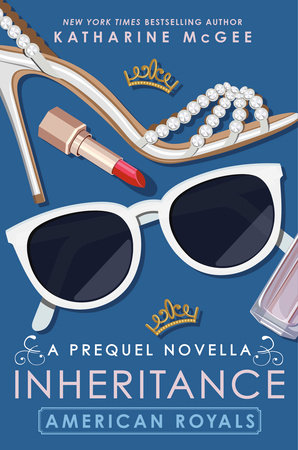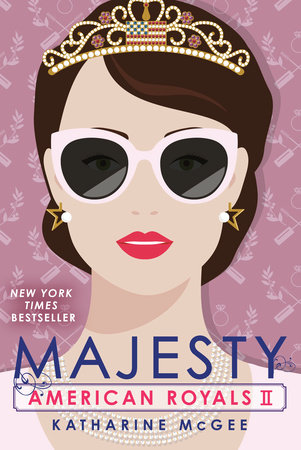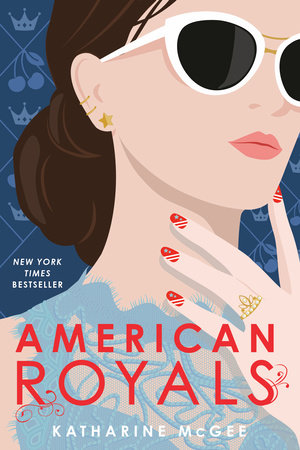Excerpt
American Royals III: Rivals
1
Beatrice
Beatrice pulled her arms overhead in a stretch. She wondered if all brides felt like this when they returned from their honeymoons: flush with a warm, relaxed pleasure.
Except that Beatrice—Her Majesty Beatrice Georgina Fredericka Louise, Queen of America—wasn’t a normal bride. Actually, since she hadn’t gotten married, she wasn’t a bride at all.
She glanced at Theodore Eaton, the man she was supposed to have wed earlier this year. His hair was an even brighter blond after three weeks in the Caribbean sun, his skin burnished to a golden tan. Beatrice knew she looked just as relaxed and well rested.
Not that it would last, with everything that lay ahead.
In the weeks following their non-wedding, Beatrice had remained in the capital, dealing with the aftermath of her decision. She had reviewed infrastructure bills and ambassadorial appointments, and had studied foreign legislation and trade policies in preparation for the upcoming League of Kings conference. It was all the tedious, unglamorous work of being a monarch—the work Beatrice should have been doing since her father died, if she hadn’t allowed herself to be sidetracked with planning her wedding.
Porcelain platters were scattered on the table before her and Teddy, laden with the remnants of their scrambled eggs and fruit. Franklin, the golden Lab puppy that she and Teddy had adopted together—not a puppy much longer—nuzzled her leg, whining. Beatrice surreptitiously broke off a piece of toast and passed it to him under the table.
“Glad to be back?” Teddy asked.
Beatrice leaned down to rub Franklin’s velvety-soft ears. “Glad to see this guy again,” she said, and sighed. “Though I have to say, I already miss our bungalow.”
Beatrice had never really been on a vacation before. She’d traveled all over the world, but always for a diplomatic visit or state business. Even on family trips she’d been too busy skiing, or sailing, or catching up on school assignments to relax. It was a trait she’d inherited from her father. King George IV had never taken a day off work in his life. And now that he was gone, Beatrice wished that he had.
A knock sounded at the door. “Yes?” Beatrice called out.
“Your Majesty,” the footman announced, “the Lady Chamberlain is here to see you.”
Surprised, Beatrice glanced down at her watch: a platinum one that her father had given her on her eighteenth birthday, its hands starred with tiny diamonds. It wasn’t like her to be running late. She’d gotten too accustomed to island time—all those mornings when she and Teddy had lingered over breakfast, only to end up falling into bed again afterward.
Beatrice glanced at the footman, struck with an idea. “Why don’t you tell Anju to come on in?”
“Into the breakfast room, Your Majesty?”
“Why not?” Beatrice’s relationship with her former chamberlain, Robert Standish, had been stiff with formality. But beneath the incessant bowing and Your Majesty–ing, Robert hadn’t respected her at all. He’d been silently undermining Beatrice’s authority, trying to keep her from exerting any real power.
Robert had been far too stuffy and old-fashioned to even consider sitting down in the Washington family’s private breakfast room, which was precisely why Beatrice had suggested it. She was determined to do things differently this time around.
“Bee.” Teddy cleared his throat. “Do you think you could run some of my thoughts past Anju, see if we can get moving on any of them?”
She nodded. “Of course.”
America had never had a king consort before. The only real precedents for Teddy’s position were the eleven queens consort who’d come before him—most recently, Beatrice’s mother, Queen Adelaide.
So Teddy had drawn up some ideas for responsibilities he could help take on. He’d been trained as a future duke, after all; he had a great deal of experience in allocating budget, looking out for the good of his people. Beatrice knew he wouldn’t be happy doing what queens consort traditionally did—cutting ribbons, arranging tablescapes.
Of course, it wasn’t fair that the queens had been limited to domestic roles in the first place. Beatrice’s mother was one of the smartest people she knew. And, like Teddy, Adelaide had been trained to rule a duchy someday—two duchies, in fact. But once she’d married King George, she’d been relegated to a position that was more ceremonial than political. That was just the way the monarchy worked.
Until now.
Beatrice was determined to change all of that, to show people that a woman could rule as effectively as any man. Still, she didn’t want Teddy to feel purposeless. He was too talented to sit around waiting for her to need him. Even if that was, technically, the only item in his job description.
“Thanks. I’ll catch up with you later.” Teddy stood, dropping a kiss on Beatrice’s forehead as the Lady Chamberlain walked in.
After she’d fired Robert Standish, Beatrice had launched a full-scale search for a new chamberlain. She’d interviewed dozens of options before settling on Anju Mahali, who, as the former CEO of a software company, might have been the unlikeliest candidate of them all.
“Are you sure you want to hire her? She knows next to nothing about politics,” Beatrice’s mother had warned.
Honestly, Beatrice thought, the royal family needed someone with a fresh perspective. And anything Anju needed to know about politics—not to mention the intricacies of protocol—she could find in Robert’s binders and file folders. He’d certainly left enough of them.
At least Anju had some experience managing public opinion. When Beatrice had called off the wedding of the century, offering no more explanation than a vague security scare, she’d expected a public reaction. There was always a reaction to every last one of her decisions, no matter how insignificant they seemed to Beatrice. She’d met with a congressional leader at his office rather than summoning him to hers—was that a gesture of respect, or of disdain? (In reality, the palace’s air-conditioning had been out that day.) She’d worn a pair of amethyst earrings—surely that was a silent cry for help, since amethysts were known to have healing vibes. (Beatrice had been especially bemused by that claim; she’d worn the earrings because her stylist thought they matched her purple dress.)
The scrutiny had only gotten worse after her controversial decision to postpone the wedding. All summer, people had been speaking out against her, in op-eds and on talk shows and in social-media rants. It’s not that I’m antifeminist, they would begin, but—
As if that single but absolved them of anything they said next. But she’s so young and inexperienced. But it’s hard to imagine she could ever live up to her father. But she called off her own wedding; don’t you worry that’s a sign of emotional instability?
For the first time in both their lives, Samantha’s approval ratings were higher than Beatrice’s. Sam had just completed a successful royal tour, while Beatrice was the woman who’d left America’s favorite duke at the altar. The magazines that used to rave over “Queen B” now piled criticism on “Runaway B.”
In Beatrice’s opinion, their puns were getting worse.
“Welcome back, Your Majesty,” Anju said with a brisk nod. That was another thing Beatrice liked about her: she didn’t bother curtsying.
“Have you eaten?” Beatrice gestured to the breakfast spread before them. Anju ignored the food but poured herself a coffee and added a heaping scoop of sugar before taking the seat opposite Beatrice.
“As our first order of business, I’d like to review Teddy’s suggestions for ways to shape the role of king consort,” Beatrice began.
Anju hesitated. “With all due respect, Your Majesty, that’s not very time-sensitive. And many of Teddy’s suggestions—that he meet with ambassadors on your behalf, or help manage your briefings by the Trade Commission—would require congressional approval. I think we should focus on the League of Kings conference for now.”
“Right, of course.” Beatrice swallowed against a sudden panic.
The imminent convocation of the League of Kings would be her first great test as a ruler.
The League had been founded in 1895, ending the War of the Three Peters: Tsar Pieter of Russia, King Pedro IV of Spain, and Emperor Peter of Austria. In Europe it was still known as the Cousins’ War, since all three Peters were cousins through the Hapsburg line.
At its inception, the League of Kings had been something entirely new: a multinational treaty, in which all the signatory nations swore to maintain international peace and security. They agreed that every five years they would meet at one of their palaces—no politicians, no press, just the kings and their sons—to discuss issues of global importance.
Now the League of Kings comprised the monarchs of nearly every nation in the world, except a few holdouts in the Pacific who didn’t see the need to sign, like Singapore and Hawaii. Now the attendees were not only kings, but queens and empresses and sultanas, though all efforts to rename the coalition as anything but the League of Kings had sputtered out and died. And now the conferences were held all over the globe, not just in St. Petersburg or Sandringham.
The League of Kings hadn’t met in America since Beatrice’s grandfather was king. But this fall, America would be hosting the conference again, in the very first year of Beatrice’s reign.
The rotation of League of Kings hosts was a contentious and highly delicate act of international diplomacy, more prestigious—at least to the monarchs—than hosting the Olympics. Already the King of Ghana and the Emperor of Japan were fighting over the location of the conference in 2045.
Months ago, at the funeral reception for Beatrice’s father, King Frederick of Germany had asked Beatrice if she’d like to withdraw as this year’s host. “No one will blame you for stepping out of the lineup. Why don’t you let me have everyone to Rumpenheim instead?”
She knew Frederick meant well. At eighty-four, he was the current chairman of the League of Kings, and he’d been something of a mentor to Beatrice ever since she’d lived at Potsdam one summer in college, studying German.
Beatrice shook her head. “Thank you, but I need to see this through. My father was so eager to host this year’s conference.” She tried to ignore Frederick’s look of consternation as she added, “He was planning to bring his climate accord to a vote again. I’d like to finish what he started.”
“The climate accord?” Frederick repeated, frowning. “Beatrice, your father tried to pass that proposal for years, but he could never get enough people on board.”
“Only because they kept quibbling over the details.”
Climate change was one of those issues that the League of Kings agreed upon in theory, but not in practice. Whenever King George had brought it up, the discussion devolved into accusations and finger-pointing. Each monarch insisted that everyone else was a grievous offender. Why should they have to devastate their economies fixing other people’s mistakes?
“Besides,” Frederick had added hastily, “you can’t propose new business your first time at the conference. It simply isn’t done.”
“This isn’t my first conference.” As her father’s successor, Beatrice had attended the League’s most recent meeting in China, as well as the previous one in France.
There had been a few raised eyebrows that first time: most monarchs waited for their heirs to graduate from high school, or at the very least middle school, before bringing them to the conference. Determined to prove herself, twelve-year-old Beatrice had thrown herself into the work headlong. At the heirs’ info sessions, she had scribbled notes until her hand cramped, trying not to feel intimidated when she was partnered up with the Prince of Wales, who was almost twice as old as her father.
“It’s your first time attending as a ruler,” Frederick amended. “You’re in the driver’s seat now, Beatrice.”
Like her grandfather, Beatrice would host the League of Kings at Bellevue, the royal family’s palace in Orange. The League of Kings never took place at a monarch’s main residence, but instead at a summer palace or minor estate. It would have been too risky, gathering so many world leaders in a busy capital city.


